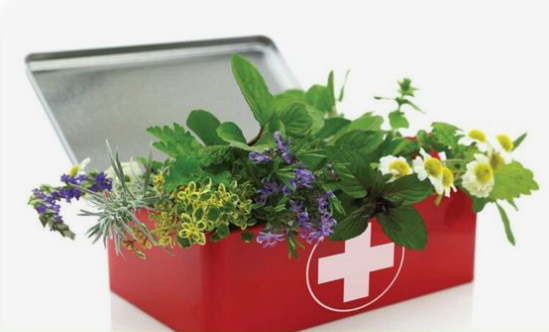
Basic Ingredients for a Home Herbal First Aid Kit
As you assemble your herbal first aid kit, you will want to include several herbs and natural remedies that can help care for the most common traumas and afflictions. Some of the main categories to include are listed below.
1. Herbs for Cuts, Scrapes, and Burns
Some of the most commonplace injuries you will encounter involve minor cuts, scrapes, and burns. And there are some great herbs to heal the skin.
Aloe Vera: This is an essential ingredient for treating burns, sunburns, and other types of skin irritations. This ingredient is cooling and anti-inflammatory in nature and hastens the healing of burns and subsides the pain.
Calendula (Marigold): The part of these plants has anti-inflammatory, antifungal, and antimicrobial action; thus, calendula can be applied to an application to heal wounds, scrapes, and cuts. Calendula is available in creams, salves, or even dried flowers.
Lavender Essential Oil: Good for soothing burns and for pain relief. Lavender also prevents scarring and infection. It is that mild and super effective essential oil that can be applied directly to the skin.
Honey: Honey has the highest antibacterial property. Therefore, it should be used in dressing wounds, burns, and cuts. Honey keeps the area moist, promotes faster healing, and results in less scarring.
2. Herbs for Pain Relief and Inflammation
Well, with just a handful of herbs, injuries and inflammation pain can be naturally minimized.
Arnica: Excellent remedy for bruise, sprain, and muscle aches. Arnica reduces the pain and swelling; thus, it makes it good for all the sport injuries as well as the minor trauma. It must be applied topically as an ointment or cream.
Turmeric is one of the products abundant with curcumin, a powerful anti-inflammatory compound. Therefore, turmeric is excellent for treating inflammations and pains from injuries, arthritis, or other chronic conditions. You can take it internally by having teas or capsules or apply it on the skin through a paste.
White Willow Bark: Since the composition contains salicin, white willow bark has been termed “nature’s aspirin.” It is useful in the alleviation of headaches, back, or joint pain.
3. Herbs to Cure Cold, Coughs, and Respiratory
The most common diseases for which herbs can cure effectively are typical colds, coughs, and respiratory conditions.
Elderberry: This antiviral herb is an excellent treatment for colds, the flu, and respiratory infections. Elderberry syrup can reduce the time course of a cold and your immune system will fight off viruses better.
Echinacea: It enhances the immune system, useful in the early stages of a cold or flu to get your body back on track faster, can be either in tea or tincture form.
Peppermint: Useful for relieving congestion and soothing sore throats. You can inhale peppermint oil or drink peppermint tea to clear your nasal passageways and get some relief from your cold symptoms
Ginger: This is a great anti-inflammatory and immune system booster and works effectively to cure sore throats and colds. You can drink it as tea or make it as a syrup to help soothe your cough.
4. Herbal Remedies for Digestive Problems
Common causes of stomach upsets, nausea, and indigestion may be relieved with the use of these herbs.
Chamomile : The calmative properties make it a perfect cure for stomach cramps, indigestion, and anxiety. Chamomile tea will help alleviate an upset stomach and ease your anxiety.
Ginger : Good for respiratory problems, ginger is also very good in treating nausea, bloating, and indigestion. Just ginger tea will quickly calm your belly and let you feel comfortable with your stomach.
Fennel Seeds: Amazing to soothe gas, bloating, and indigestion. You can chew fennel seeds after your meals or make a soothing tea for your stomach.
5. Herbs for Stress, Anxiety, and Sleep Issues
Herbal remedies provide natural respite to stress, anxiety, and sleeping problems, so that you don’t have to remain dependent on strong sedatives.
Valerian Root: Intensely calming herb. Potent for deep, restful sleep. Often used as a natural alternative to sleeping pills.
Passionflower: One of the most soothing herbs, which helps with a decrease in anxiety and inducing sleep. Extremely good for those who can’t seem to wind down or have light insomnia.
Lemon Balm: Calming, uplifting herb to soothe stress and anxiety. Lemon balm tea is an easy addition to your herbal first aid kit for controlling everyday stress.
Ashwagandha: Adaptogen to help your body adapt to stress and relax more. Ashwagandha is prepared and administered in powder or capsule form.
Preparation and Storage in Your Herbal First Aid Kit
Organize it in an easy-to-access manner and keep it in the proper place.
Glass Jars or Tins: Store dried herbs in air-tight glass jars or metal tins. Make sure to label every jar, with the name of the herb and primarily the herb’s use.
Essential Oils: Store essential oils in dark glass bottles, so they do not damage the oil, which may end up lowering its quality due to light.
Herbal Tinctures: Tinctures are liquid extracts of herbs in alcohol or glycerin. Tinctures are concentrated; therefore, they are good for a long time. You can also include them in your kit.
Salves and Balms: Herbal salves and balms should be kept in small tins or jars. Always keep them sealed tight for potency.
Balms: Herbal arnica or calendula ointments are best kept in little tubes or tins in a room temperature environment.
Conclusion
A home herbal first aid kit, therefore, becomes a very handy resource for those who want to tackle the minor injuries and ailments that may come along with natural management. A health care practitioner incorporating herbs and natural remedies into his practice will not only be spared the often unappealing after effects of synthesized drugs but also enable holistic, more long-term healing. The best part is that most of the herbs mentioned are easy to grow at home, so this will really be a sustainable and cost-effective way of caring for the health of my family.
Having aloe-vera, lavender, arnica, and ginger at your fingertips, you are prepared to deal with minor cuts and burns, as well as those colds and stress attacks. Take some time to put together your herbal first aid kit and enjoy the peace of mind that means all these natural, effective remedies are just a step away.




